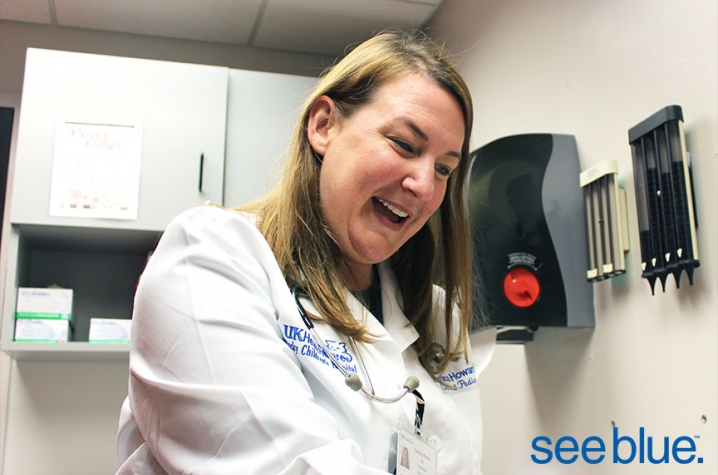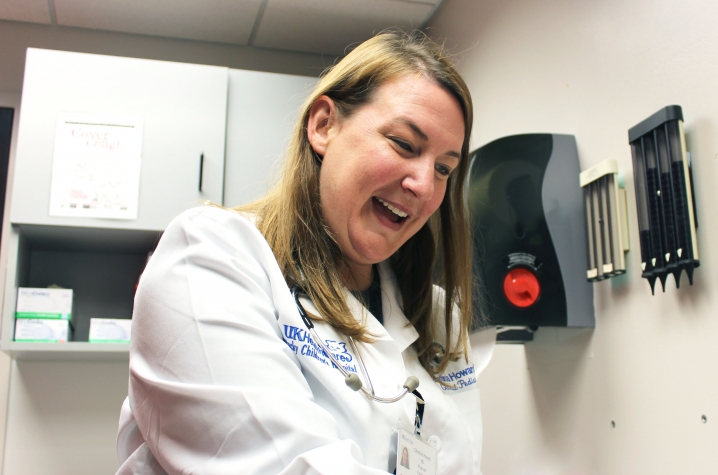KCH Developing Program to Help Kentucky Pediatricians Handle Cases of Child Abuse
LEXINGTON, Ky. (Oct. 14, 2015) — Pediatricians routinely examine bangs, bruises and bone fractures — the standard acute injuries resulting from normal childhood activity.
But in rare cases, a pediatrician must also question whether a child’s injury was the consequence of an accident or a sign of physical abuse or maltreatment. When a caregiver’s explanation isn’t consistent with the medical evidence or a child informs a provider of mistreatment, the pediatrician grapples with either reporting their suspicion or remaining silent.
To help Kentucky pediatricians navigate these sensitive situations, Kentucky Children’s Hospital (KCH) hired its first pediatric specialist in child abuse pediatrics, a subspecialty of pediatrics concerned with examining medical evidence to investigate instances of child abuse or maltreatment. Dr. Christina Howard brings an elevated level of expertise in forensic medicine to KCH after completing a fellowship program with Dr. Melissa Currie at the University of Louisville. Her arrival at KCH signifies the establishment of the first pediatric forensic medicine program to serve Central and Eastern Kentucky. In addition to Howard, Dr. Jacqueline Sugarman, also a board-certified child abuse pediatrician and who has done significant work with the Lexington Child Advocacy Center, and KCH pediatrician Dr. Jaime Pittenger, who has a special interest in child abuse pediatrics, will assist with the program.
Howard works across disciplines and departments at UK HealthCare to advise on cases where medical evidence suggests the possibility of physical or sexual abuse to a child. Acting as a neutral expert, she collects and delivers medical information to several entities involved in a child’s welfare, including representatives of the criminal justice system, law enforcement and child protective services when appropriate. In addition, she consults with pediatric providers across Central Kentucky to assist with the process of investigating and reporting cases of child abuse or neglect.
“It’s hard for pediatricians because they have relationships with families,” Howard said. “It’s difficult to even consider abuse when you are close with a family; they are in a tough position.”
As part of her fellowship training, Howard completed a variety of multidisciplinary rotations both inside and outside the medical field. In addition to training with neurosurgeons and orthopedists, she spent time with members of the judicial system, including court advocates and state attorneys. In addition to working on specific cases, Howard holds a legislative role, pushing for policies designed to prevent and detect cases of child abuse. She advocates with Kosair Charities Face It Campaign to support legislation that will train teachers to identify signs of physical abuse in their students and know how to act to do if they have a concern of abuse.
Every year in the U.S., an estimated two million cases of child abuse are reported to child protective services. According to the Kentucky Department for Community Based Services Child Abuse and Neglect Annual Report of Child Fatalities and Near Fatalities for the 2015 fiscal year, 74 percent of children who died from abuse or neglect were under the age of 2. Howard and her colleagues are frequently involved in cases that deal with children under the age of 4 who are incapable of reporting how an injury occurred, as well as children up to 18 years of age. They are available to help when there are concerns in either physical abuse or sexual abuse.
Howard emphasized the purpose of forensic medicine is to protect children. She said medical evidence could also be useful for absolving a family member or caregiver of any wrongdoing.
“Abuse is not something we want to miss, but it is also just as important not to call something abuse when it is not,” she said.
“We call it forensics because we look at the whole picture. We don’t just look at an ear bruise and say that’s diagnostic — we take everything into consideration.”
Howard can be reached at 859-218-6727 or ukpedfor@uky.edu.
MEDIA CONTACT: Elizabeth Adams, elizabethadams@uky.edu






